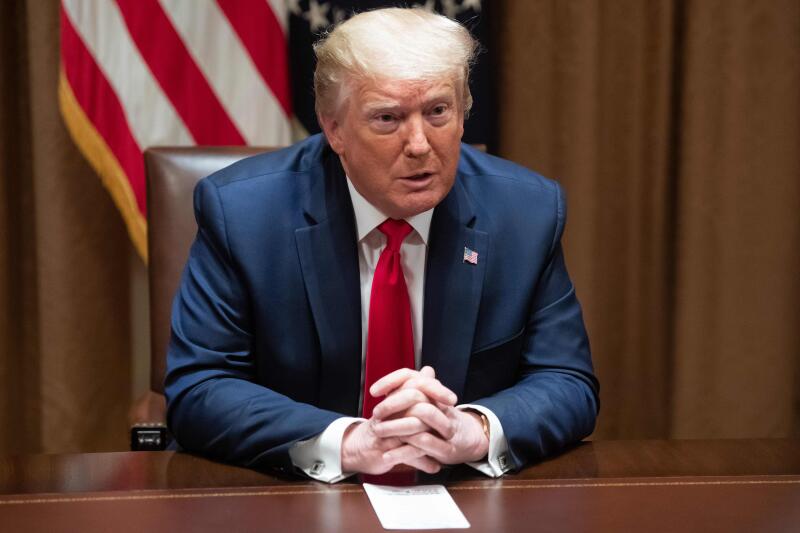Trump authorises sanctions over ICC Afghanistan war crimes case
Sign up now: Get ST's newsletters delivered to your inbox

US President Donald Trump has repeatedly assailed International Criminal Court set up to prosecute war crimes.
PHOTO: AFP
WASHINGTON (REUTERS) - United States President Donald Trump on Thursday (June 11) issued an executive order authorising sanctions against individuals involved in an International Criminal Court investigation into whether US forces committed war crimes in Afghanistan.
In announcing the action, Trump administration officials said the Hague-based tribunal threatens to infringe upon US national sovereignty and accused Russia of manipulating it to serve Moscow's ends.
"We cannot, we will not stand by as our people are threatened by a kangaroo court," Secretary of State Mike Pompeo said in announcing the move.
Rights activists assailed Mr Trump's move. Ms Andrea Prasow, the Washington director for Human Rights Watch, said the action "demonstrates contempt for the global rule of law" and represents a "blatant attempt at obstruction."
The order authorises Mr Pompeo, in consultation with Treasury Secretary Steven Mnuchin, to block assets in the US of ICC employees involved in the probe, the official said.
It also authorises Mr Pompeo to block entry into the US of these individuals.
Mr Trump has repeatedly assailed the ICC, which is based in the Hague and set up to prosecute war crimes, genocide and crimes against humanity. It has jurisdiction only if a member state is unable or unwilling to prosecute atrocities itself.
The US action is the latest under Mr Trump taking aim at an international body. Mr Trump, who has promoted an "America First" policy during his presidency, last month said he would end the US relationship with the World Health Organisation.
Afghanistan is a member of the ICC, though Kabul has argued that any war crime should be prosecuted locally.
"The Department of Justice has received substantial credible information that raises serious concerns about a long history of financial corruption and malfeasance at the highest levels in the office of the prosecutor," said Attorney-General William Barr, who did not offer evidence.
Mr John Bellinger, the State Department's former top lawyer under Republican former President George W. Bush, said the two sides could have avoided the conflict but chose not to.
"It's unfortunate that the long-running US dispute with the ICC has reached this new low point. The prosecutor should never have picked this fight with the United States, which will undermine international support for the court.
"It's not surprising that the Trump administration has reacted forcefully with threatened sanctions, especially in an election year," Mr Bellinger added.
The US government has never been a member of the court, established in 2002. The Trump administration imposed travel restrictions and other sanctions against ICC employees a year ago.
"The International Criminal Court's actions are an attack on the rights of the American people and threaten to infringe upon our national sovereignty," said White House Press Secretary Kayleigh McEnany in a statement.
"The International Criminal Court was established to provide accountability for war crimes, but in practice it has been an unaccountable and ineffective international bureaucracy that targets and threatens United States personnel as well as personnel of our allies and partners," Ms McEnany added.
The ICC decided to investigate after prosecutors' preliminary examination in 2017 found reasonable grounds to believe war crimes were committed in Afghanistan and that the ICC has jurisdiction.
A senior administration official, describing the order to a group of reporters on a conference call, said the directive authorises sanctions against any individual directly engaged in any effort by the ICC to investigate US personnel without American consent.
The official said the probe threatens to infringe on American sovereignty and that while the ICC was established to provide accountability, "in practice the court is an unaccountable, ineffective and out-of-control international bureaucracy that threatens American service members and intelligence officers and those of our allies".
ICC prosecutor Fatou Bensouda wants to investigate possible crimes committed between 2003 and 2014, including alleged mass killings of civilians by the Taleban, as well as the alleged torture of prisoners by Afghan authorities and, to a lesser extent, by US forces and the CIA.
"We have reason to believe there is corruption and misconduct at the highest levels of the ICC's office of prosecutor, calling into question the integrity of this investigation into American personnel. We are concerned that Russia may be manipulating the ICC by encouraging these allegations into US personnel," the US official said.


